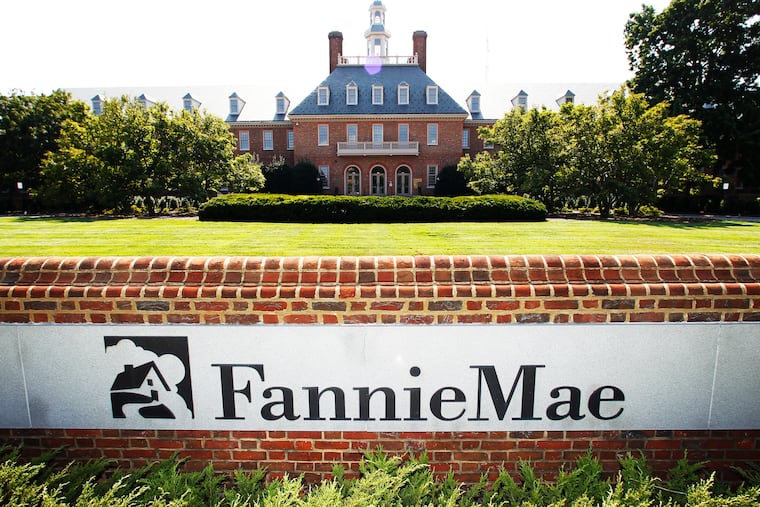Mortgage refinancing is about to get more expensive
Homeowners have been knocking down mortgage lenders’ doors looking to refinance their loans to take advantage of record-low interest rates. But refinancing is about to cost more thanks to a new fee.

All year, homeowners have been knocking down mortgage lenders’ doors looking to refinance their loans to take advantage of record-low interest rates. But refinancing is about to cost more.
Fannie Mae and Freddie Mac, the government-controlled mortgage financiers, will charge a new 0.5% fee on refinanced loans starting Sept. 1. The government-sponsored entities said the fee is necessary to offset future costs of delayed and delinquent loan repayments resulting from high unemployment and economic uncertainty during the coronavirus pandemic. Borrowers with loans backed by the entities who haven’t locked in their rates can expect an average of $1,000 to $1,500 to be added to the costs of refinancing.
Homeowners who are hurting financially because of the pandemic have looked toward refinancing to decrease monthly mortgage payments for some relief on bills, said New Jersey State Sen. Troy Singleton (D., Burlington), chair of the Senate Community and Urban Affairs Committee, which covers housing policy. Homeowners also have been pulling money out of their homes for expenses.
“There are folks that are utilizing the equity in their home just to make ends meet,” he said. “When you impose this fee, it just hurts people at the absolute wrong time.”
More than three in five mortgage applications were refinances last week, according to the Mortgage Bankers Association. The fee stands to reduce homeowners’ monthly savings on payments.
In response to criticism, the heads of Fannie Mae and Freddie Mac issued a joint statement this week, saying the fee will help fund ongoing support for homeowners and renters during the pandemic.
“Throughout this crisis, our companies have provided unprecedented liquidity and stability to the mortgage market,” they wrote. “The actions we have taken in the last few days with the support and direction of FHFA will ensure we can continue to maintain that stability over the long term.”
» READ MORE: Why home equity matters when you try to refinance your mortgage
They estimated that for the average refinanced mortgage, homeowners would likely see a reduction in savings of $15 per month due to the fee. The government is planning to release Fannie Mae and Freddie Mac from conservatorship within the next few years and allow them to become private entities.
Politicians, the Trump administration, real estate agents, and mortgage lenders oppose the fee, and opponents refer to it as a refinancing tax. Trade groups such as the Mortgage Bankers Association and the Community Mortgage Lenders of America are lobbying against the fee. The latter, which represents small and mid-size lenders, has asked for a delay until Nov. 1.
The announcement of the fee by the Federal Housing Finance Agency, which regulates Fannie Mae and Freddie Mac, caught the industry off guard and came “with very little justification,” said Kyle Manseau, senior vice president of operations at Allied Mortgage Group, based in Bala Cynwyd.
» READ MORE: When does refinancing into a 15-year mortgage make sense?
Although the government-sponsored entities would charge the fee to lenders, Manseau said many “will be left no choice” but to pass the fee on to homeowners. Since the average loan of the company’s customers in Pennsylvania is $250,000, borrowers can expect to pay an average of $1,250 more.
Allied Mortgage Group will pay the fee for borrowers whose loans and rates are locked in, but “we can only absorb this fee for so long,” Manseau said. The deluge of homeowners wanting to refinance their loans has created backlogs that mortgage servicers are struggling to work through. Borrowers are pursuing refinanced loans with Allied Mortgage Group in the largest numbers the company has seen in its 27 years, Manseau said.
» READ MORE: Mortgage rates have dropped to the lowest levels in history, aided by the coronavirus stimulus standoff
“The timing couldn’t have been worse,” he said. “This is when homeowners need the help the most.”
That has been a common message from those who oppose the new fee.
“Diluting the benefit of refinancing and discouraging homeowners from doing so during the worst economic downturn in 90 years doesn’t make sense,” Greg McBride, chief financial analyst at personal finance website Bankrate.com, said in a statement. “As if there aren’t enough fees involved in refinancing, as if the process doesn’t contain enough unwelcome surprises for the borrower, now you have this.”